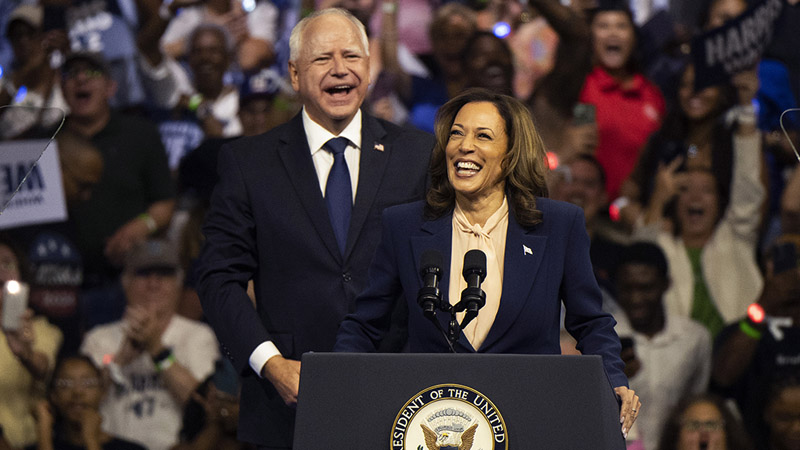“Enthusiasm Surges Among Democratic Voters”: New Gallup Poll Signals Optimism for Harris in Upcoming Election

AP Photo/Joe Lamberti
With the 2024 presidential election just days away, Democrats have fresh reason to feel hopeful. A new Gallup poll shows a significant enthusiasm advantage for Democratic voters, with 77% expressing increased motivation to vote—compared to 67% of Republicans. This difference in enthusiasm could signal a stronger-than-expected turnout for Democratic candidate Kamala Harris, potentially shaping the outcome of a tightly contested election.
Unlike traditional election polls that track candidate popularity, Gallup’s survey focuses on public opinion around voter enthusiasm and campaign outreach effectiveness. In its latest survey, Gallup posed the question, “Compared to previous elections, are you more enthusiastic than usual about voting, or less enthusiastic?”
The results showed Democrats leading Republicans in enthusiasm, a dynamic that historically tends to favor the party with higher voter motivation on Election Day. In 2024, Democratic enthusiasm is even higher than in 2008, a landmark year for the party when 76% of Democrats said they were more eager to vote—a response often linked to the historic election of President Barack Obama.
Republican enthusiasm, while lower than Democrats this year, also shows a slight increase over past cycles, rising from 61% in 2008 to 67% today. Another telling statistic from Gallup’s poll reveals that Harris’s base is more energized than President Joe Biden’s was in 2020, with 77% of Democrats now reporting high enthusiasm compared to Biden’s 75% during his campaign.
“Since Gallup first asked the question in 2000, the enthusiasm measure has shown a mixed relationship with presidential election outcomes,” noted Gallup’s Jeffrey M. Jones. He explained that in previous cycles, an enthusiasm edge often, though not always, preceded a party victory: Democrats had enthusiasm advantages in both 2008 and 2020, which led to wins, while Republicans had an edge in 2012, a year they ultimately lost.

The discussion around Harris’s prospects in the upcoming election has sparked interest beyond the poll itself. Alejandra Caraballo, a clinical instructor at Harvard Law School’s Cyberlaw Clinic, shared Gallup’s findings on social media platform Bluesky, where she argued that Harris’s polling strength may be underestimated due to insufficient representation of women voters in polling samples.
“I fully expect her to win by 4 and I’ll take the over,” Caraballo wrote, suggesting that Harris could exceed current expectations if pollsters adjust for what she sees as a gender sampling gap. Caraballo’s analysis dives into the specifics, pointing out that current polls, like a recent YouGov/CES survey, do not show Harris leading among women in any age group—a discrepancy that Caraballo finds suspicious.
“Kamala doesn’t win women in any age group,” she explained, “But Biden won women by 9 and they made up 56% of the electorate.” She questioned whether pollsters are accurately capturing the likely female turnout, which was significant for Biden in 2020. As Election Day draws closer, Gallup’s findings and Caraballo’s insights underscore the role voter enthusiasm may play in determining the final results.
The high level of motivation among Democratic voters could prove decisive if it translates into a strong turnout on Tuesday. Both campaigns will be watching closely, as the enthusiasm advantage could tip the scales in this fiercely contested election. With Democrats energized and Harris’s supporters showing up in larger numbers than anticipated, the 2024 election could hinge on who manages to bring their base to the polls in force.


